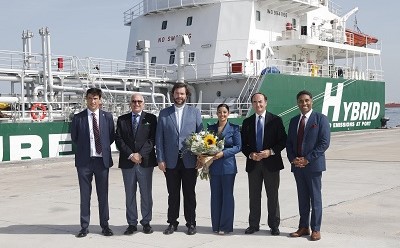- The Port of Algeciras hosts this event, attended by representatives from both companies, the APBA, and authorities from the Campo de Gibraltar region
- This is Europe’s first electric-diesel hybrid supply vessel, contributing to decarbonizing maritime transportation and ports
- Since January, it has been operating in the Bay of Algeciras, supplying both second-generation biofuels and conventional fuels
The ‘Bahía Levante’, equipped with four power generators enabling electric propulsion, achieves a 30% reduction in fuel consumption and over 35% decrease in greenhouse gas emissions compared to conventional supply vessels, helping to prevent the annual emission of more than 2,000 tons of CO2. In addition, thanks to a battery system for auxiliary services in port, it generates no carbon emissions when docked.
In addition to these environmental advantages, there are benefits related to the supply of second-generation biofuels, which began with this vessel in September. These sustainable fuels can be utilized without ship modifications and have the potential to decrease greenhouse gas emissions by up to 90% throughout their lifecycle compared to traditional fossil fuels.
The event was chaired by Samir Fernández, director of Cepsa’s Marine Fuel Solutions area; Jose Luis Caraballo, general manager of Mureloil; and Gerardo Landaluce, president of the Bay of Algeciras Port Authority (APBA), along with other company representatives and officials from the Campo de Gibraltar region.
During his speech, Samir Fernández highlighted that “this vessel reflects Cepsa’s dedication to decarbonizing maritime transportation and ports, particularly in Andalusian ports. We are determined to maintain our leadership in marine fuel supply, offering our customers increasingly sustainable solutions through vessels that are also environmentally friendly.”
Meanwhile, José Luis Caraballo emphasized that “the vessel represents a substantial investment by Mureloil in a more sustainable future, showcasing our commitment to preserving our seas and the environment. Our future objective is to keep building ships by integrating the innovations and new technologies developed to achieve emissions-neutral ships.”
Lastly, Gerardo Landaluce took the opportunity to highlight that the Port of Algeciras provides approximately 4 million tons of fuel to its customers, a significant portion of which is low in sulfur, even predating the implementation of the IMO 2020 regulations. This positions the port as a market leader in the Mediterranean. Landaluce underscored the objective to “consolidate Algeciras as the top choice for refueling in the Strait of Gibraltar, supporting initiatives like those of Cepsa and Mureloil. These initiatives not only reduce emissions during operations but also ensure the supply of both transitional and future fuels.”
The European Commission’s Fit for 55 package incorporates the legislative initiative ‘FuelEU Maritime’ with the goal of reducing greenhouse gas emissions in maritime transport. Specifically, it contemplates a 2% reduction by 2025, 6% by 2030, and 80% by 2050, compared to 2020 levels. Additionally, from 2030 onwards, ships will be mandated to connect to shore-side electricity supply while docked, unless they use alternative zero-emission technologies.
Cepsa has a diversified portfolio of solutions to facilitate the decarbonization of maritime transport. In addition to biofuels, it includes products such as liquefied natural gas (LNG). Moreover, Cepsa will be able to supply synthetic marine fuels, such as green ammonia or methanol, in the future. The company will produce them within the Andalusian Green Hydrogen Valley, the largest green hydrogen project in Europe.



